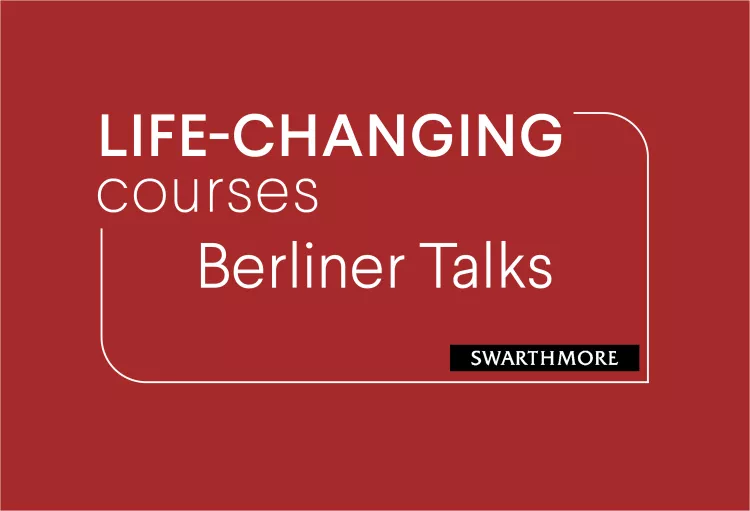Life-Changing Courses: Berliner Talks

The past year has been difficult, but thankfully, instructors like Christopher Schnader, senior lecturer in the German Studies section, have made the most of it.
Before the pandemic, Dr. Schnader — or “Herr Schnader,” as he prefers to be called by students on campus — led the weekly German language table, in which speakers of all levels could come together to enjoy casual German conversation over lunch at Sharples. When it became clear that teaching would be mostly virtual last fall, Schnader decided to stay where he was at the time — in Berlin.
“It made sense, since I was over in Germany, to have students see a variety of locations and interact with locals,” says Schnader. And so the German language table gatherings became the Berliner Talks, allowing students to connect with each other while interacting with special guests throughout the German capital. Students could experience everything from quirky kiezkultur (“local flair”) to a private tour of the Bundesrat (“Federal Council”).
From across the pond, Schnader hosted the Berliner Talks last fall and through most of this spring. He sometimes broadcast live on location, and always hosted a wide array of guests along the way, including two Swarthmore alumni living in Berlin. The Berliner Talks were not “tourist highlights of Berlin,” says Schnader, “but rather sites of historical or civic importance” like the Bundesrat, the AlliiertenMuseum (“Allied Museum”), and the Stasi-Unterlagen-Archiv — the archives of the former East German spy network. Or locations and guests that allowed participants to gain a sense of everyday city life by directly interacting with those who live and work there.
“I’m very grateful to family and friends who have served as guests and who helped me secure a wide range of those who could talk with us about various topics,” says Schnader. In addition to Germans and other Europeans who have made Berlin their home — including a Czech musical performer who discussed collaboration on an original work — the talks featured several German-speaking Americans who have settled in the capital, including a publisher, the founder of a language school, a yoga entrepreneur, and a translator for films who’s worked with director Wes Anderson.
“The one thing that’s really amazing [was] the breadth and depth and diversity of the guests, from the LGBTQ publisher in the ‘gayborhood’ to people working in ecological nonprofits to politicians to getting architects’ perspectives on culturally significant buildings in the hauptstadt,” or capital, says Professor of German Sunka Simon. “Chris has his finger on the pulse of cultural moments.”
Especially memorable for Annabel Zhao ’24, a prospective German minor, was an architect who helped design the recently opened Berlin Brandenburg Airport.
“The airport used a lot of really high-quality supplies, and its design was very beautiful, regal, and sleek,” says Zhao. “They wanted to create a different first impression of the city and challenge the concept of Berlin as very schmuddelig.” (Schmuddelig more or less translates to “gritty” in English.)
The unique opportunity afforded by the Berliner Talks helped glue the Swarthmore community together in an otherwise isolating time. Students, professors, and other community members all participated in the sessions each week.
“It’s been a real silver lining on a hard year,” says Frances Tate, the wife of Professor and Section Head of Japanese Will Gardner. Tate, an accomplished professional musician who found herself with “a lot more time in the pandemic,” decided to attend the Berliner Talks, as well as Schnader’s German Conversation class.
“The first time I tuned in, he showed us the Brandenburg Gate. I was just sitting in my living room. I loved seeing the architecture and him walking around,” recalls Tate, who has not yet been to Berlin.
“In the pandemic, we couldn’t really go places,” says Mia Limmer ’22, an honors linguistics major who has also never been to Berlin. “It was really nice to see someone walking around another city.” Limmer also notes that the Berliner Talks were “a great way to practice oral proficiency.”
Although Schnader returned to Pennsylvania for the last half of the spring semester, he continued the weekly series, either with guests joining virtually from Berlin or by visiting sites closer to Swarthmore, such as Amish farmlands or the German Society of Pennsylvania.



